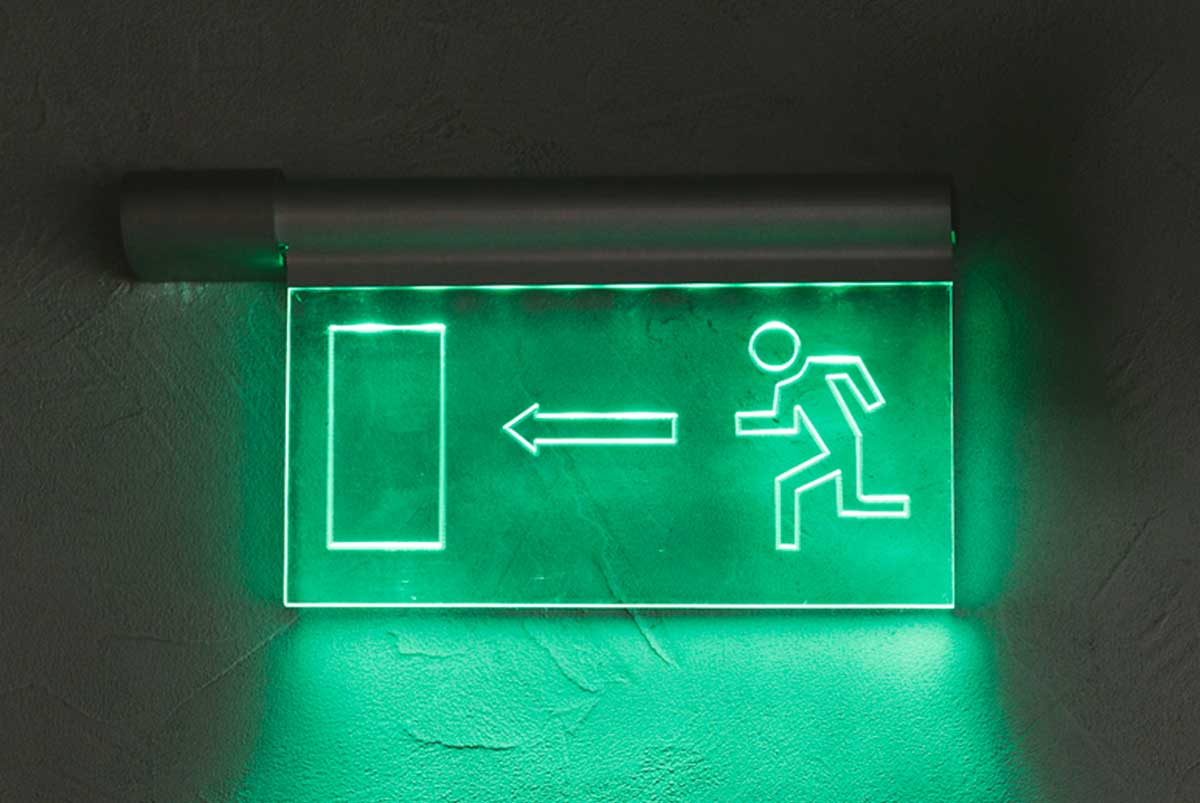Ready To Buy a Home?
Get Approved to Buy a Home
Rocket Mortgage® lets you get to house hunting sooner.
Whether it’s a bad first date, an awkward family dinner or a client meeting that goes on forever, life is full of situations that may require a smart exit strategy. The best exit strategies are as drama-free as possible and can reduce or eliminate any hard feelings.
Home buying can be a lot like that, too. Maybe you thought you found the perfect home, but you get cold feet and decide to back out after you’ve made your offer.
You can back out of buying a house. You’ll just need to keep your wits about you, plan ahead and be considerate of other people’s feelings. You can make a graceful exit and move on to the next, and hopefully right, home for you.
Should You Back Out of Buying a House?
Making an offer on a home should never be done lightly because once the contract is signed, it is legally binding. Making an offer and getting it accepted means you’re well on your way to buying a home. And, while exciting, the home buying process has legal and financial consequences for both you and the seller.
To show the seller you’re serious, most real estate transactions require you to put an earnest money deposit (or good faith deposit) into an escrow account before actually buying the property (usually, within 3 – 5 days after your offer is accepted by the seller). Since you could potentially lose the deposit under certain conditions, the money serves as an incentive to follow through on your offer.
Reasons to back out of buying a house
There are many reasons why you might decide to back out of a home purchase. Your financial situation can change, the opportunity to buy another home might appear or there may be issues with the home that weren’t apparent at first glance (or even in the inspection report).
We know buying a home is a big decision that can feel overwhelming at times, and you may have your fair share of doubts during the process. While these feelings are natural, they alone shouldn’t determine whether you go through with buying the home.
That’s one of the reasons why it’s important to have a real estate agent you trust. Your agent can help answer questions, ease any doubts and help you make smart decisions.
Can You Back Out of Buying a House Before Closing? Yes, With Consequences
It’s possible to back out of buying a house before closing. But it needs to be done strategically. Otherwise, you risk losing your earnest money deposit and the money you paid for inspections and appraisals. Once both parties have signed a purchase agreement it becomes much more difficult legally to back out of the deal.
Your first opportunity to back out will come during that narrow window between the time your offer is accepted and the time your real estate contract/purchase agreement is signed and you’ve made your earnest money deposit.
Just know that if your and the seller’s real estate agents work fast, they could hammer out an agreement pretty quickly. So your window to back out at this point is usually less than a day.
That’s why you have to include an exit strategy in your purchase agreement.
How Can You Back Out of Buying a House?
The best way to back out is to think ahead.
When your real estate agent drafts the home purchase agreement, it should include several contingencies. Think of them as “escape routes” or legal ways to get out of a contract.
Contingencies provide both the buyer and seller with opportunities to back out of the deal. Each contingency includes:
- Conditions that must be met
- Contingency deadlines (during which conditions must be met)
- Clarification about penalties if conditions aren’t met (such as losing earnest money)
Here’s the thing about contingencies: They can only help you if they’re in the purchase agreement and the contingency language is as precise as possible. If a contingency isn’t in the agreement, or the terms aren’t clear, it can lead to trouble down the road.
When negotiating your purchase agreement or contract, work with your real estate agent to make sure you understand all the contingencies that let you back out of buying a house. Before you sign your purchase agreement, look for these common contingencies:
Financing contingency (aka mortgage contingency)
The financing or mortgage contingency allows buyers to back out of a contract if they are unable to obtain a mortgage from a lender to purchase the property.
Home inspection contingency
A home inspection contingency gives you the right to inspect the home for defects and to walk away from buying the house if you are unsatisfied with the results of the inspection.
Appraisal contingency
An appraisal contingency means the purchase of the home is dependent on the property appraising at an amount equal to or higher than the purchase price.
Home sale contingency
Many people who buy a home need to sell their previous home to pay for the new one. The home sale contingency provides buyers with a window of time to sell their home; if they can’t sell or don’t get a strong enough offer, they can back out of buying the new one.
Title contingency
The title contingency gives the buyer the right to cancel the purchase contract if the title search turns up any liens, judgments or other encumbrances associated with the property. For example, if an unpaid tax lien shows up on the title search, you can walk away from buying the house or negotiate with the seller.
Force majeure contingency
Force majeure is French for “superior force.” It refers to extraordinary circumstances or events such as war, illness, death or natural disaster. Though using force majeure to back out of buying a home is a challenge, force majeure can be used to delay settlement due to weather, illness or other factors out of people’s control.
Coronavirus contingency
A COVID-19 contingency would likely play into force majeure, since a global pandemic is, by many accounts, considered a force majeure.
HOA contingency
Buyers purchasing a condo, co-op or any other property that’s part of a homeowner’s association (HOA) can use the HOA contingency to back out of buying the property. Buyers have the right to review HOA documents, such as the rules of the HOA, and if they don’t like what they see, they are under no obligation to move forward with purchasing the property.
What Happens if You Back Out When It’s Too Late?
If you need to back out of buying a house and the reason meets the terms of a contingency, you should be able to walk away with your earnest money.
No harm, no foul.
But there may be circumstances where you need to back out of a sale, but there are no contingencies you can exercise.
In that case, you may have to walk away and wave goodbye to your earnest money deposit. And, depending on the situation, you might run the risk of being sued by the seller.
The seller may feel they’re owed money for expenses since they took their house off the market for you. Maybe they kept their house off the market during a peak selling season. Maybe backing out has delayed their ability to sell their home and find a new one for themselves.
You may even face a lawsuit from the seller’s real estate agent if they feel they’re being cheated out of a commission.
It’s important to note that lawsuits are the exception rather than the rule. But if you don’t want to spend time and money on legal fees, it’s best to make as clean and gracious an exit as possible.
Backing Out With Style
Buying a home is a big decision. It’s not unusual to feel uncertain at any point in the home buying journey. This is when working with real estate professionals helps. Before backing out of buying a house, talk to your real estate agent and be honest about the reasons why you want out. It’s their job to protect your interests. And they can help you figure out if you’re making the right decision.
If you do decide to back out of buying a home, take advantage of all your legal options. It also helps to treat the seller as you would want to be treated if it was your home on the market.
Get approved to buy a home.
Rocket Mortgage® lets you get to house hunting sooner.
The Short Version
- It’s possible to back out of buying a house before closing. But it needs to be done strategically. Otherwise, you risk losing your earnest money deposit
- When negotiating your purchase agreement or contract, work with your real estate agent to make sure you understand all the contingencies that let you back out of buying a house
- Before backing out of buying a house, talk to your real estate agent and be honest about the reasons why you want out




